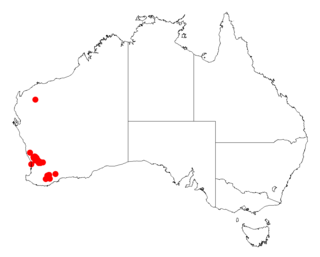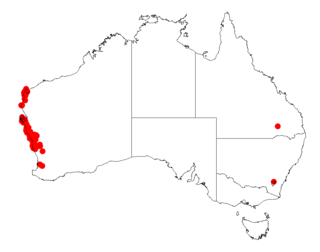Acacia gibsonii, commonly known as Gibson's wattle, is a shrub belonging to the genus Acacia and the subgenus Juliflorae.

Acacia yorkrakinensis is a shrub belonging to the genus Acacia and the subgenus Juliflorae that is native to Western Australia.

Acacia andrewsii is a shrub belonging to the genus Acacia and the subgenus Phyllodineae that is endemic to western Australia.

Acacia chartacea is a shrub or tree belonging to the genus Acacia and the subgenus Phyllodineae endemic to an area along the west coast of Western Australia.

Acacia concolorans is a shrub belonging to the genus Acacia and the subgenus Phyllodineae that is endemic to Western Australia.

Acacia crassistipula is a shrub belonging to the genus Acacia and the subgenus Phyllodineae that is endemic to western Australia.

Acacia dempsteri is a shrub belonging to the genus Acacia and the subgenus Phyllodineae endemic to south western Australia.

Acacia dorsenna is a shrub belonging to the genus Acacia and the subgenus Phyllodineae that is endemic to Western Australia.

Acacia errabunda is a shrub belonging to the genus Acacia and the subgenus Phyllodineae native to Western Australia.

Acacia glaucocaesia is a shrub or tree belonging to the genus Acacia and the subgenus Phyllodineae that is endemic to north western parts of Australia.

Acacia heterochroa is a shrub belonging to the genus Acacia and the subgenus Phyllodineae that is endemic to south western Australia.

Acacia hystrix is a shrub belonging to the genus Acacia and the subgenus Phyllodineae that is endemic to south western Australia.

Acacia lanceolata is a shrub belonging to the genus Acacia and the subgenus Phyllodineae and is endemic to a small area of western Australia.

Acacia profusa is a shrub of the genus Acacia and the subgenus Phyllodineae that is endemic to south western Australia.

Acacia robiniae, commonly known as Robin's wattle, is a shrub of the genus Acacia and the subgenus Phyllodineae that is endemic to south western Australia.

Acacia rossei, also known as Yellowdine wattle, is a shrub of the genus Acacia and the subgenus Phyllodineae that is endemic to south western Australia.

Acacia ryaniana is a shrub of the genus Acacia and the subgenus Phyllodineae that is endemic to an area along the west coast of Australia.

Acacia spathulifolia commonly known as Gold carpet or the Gold carpet wattle is a shrub of the genus Acacia and the subgenus Phyllodineae that is endemic to coastal parts of western Australia.

Acacia validinervia also commonly known as nyalanyalara, nyala nyala, alumaru or blue wattle, is a shrub of the genus Acacia and the subgenus Phyllodineae endemic to arid areas of inland Australia.

Acacia vittata, commonly known as Lake Logue wattle, is a shrub of the genus Acacia and the subgenus Plurinerves that is endemic to a small area in western Australia.


















